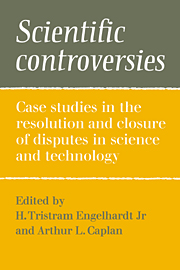 Scientific Controversies
Scientific Controversies Published online by Cambridge University Press: 03 February 2010
Two court cases in the early 1980s have focused public attention on controversies in the regulation of occupational exposure to toxic substances. The benzene standard, promulgated by the Occupational Safety and Health Administration (OSHA) in 1978, was invalidated by the Supreme Court in 1980 on the grounds that the agency had failed to demonstrate a significant health risk from low-level exposure to benzene. In 1981, however, the court upheld OSHA's standard regulating exposures to cotton dust and ruled that the agency could not use cost-benefit analysis to set permissible exposure levels. I want to discuss some of the issues raised by these cases. What are the challenges created by the Court's assignment to OSHA of a duty to make a threshold determination of significant risk before regulating? Is the dismissal of cost–benefit analysis a movement away from rationality in the standard-setting process? What is the role of economic and scientific experts in resolving these conflicts? Are the courts the appropriate way to achieve closure in this area?
Two themes underlie my remarks. One is that efforts to control exposures to toxic substances are typically debated in a context of scientific uncertainty. The decision to act or not must usually be made before closure of scientific debate has been achieved. Normative and policy considerations therefore become crucial, not only in assessing what to do about known occupational risks but also in characterizing risk and developing a regulatory strategy in the face of scientific uncertainty.
The second theme is that public policy concerning occupational safety and health essentially involves the normative balancing of competing claims of rights, justice, and public values.
To save this book to your Kindle, first ensure [email protected] is added to your Approved Personal Document E-mail List under your Personal Document Settings on the Manage Your Content and Devices page of your Amazon account. Then enter the ‘name’ part of your Kindle email address below. Find out more about saving to your Kindle.
Note you can select to save to either the @free.kindle.com or @kindle.com variations. ‘@free.kindle.com’ emails are free but can only be saved to your device when it is connected to wi-fi. ‘@kindle.com’ emails can be delivered even when you are not connected to wi-fi, but note that service fees apply.
Find out more about the Kindle Personal Document Service.
To save content items to your account, please confirm that you agree to abide by our usage policies. If this is the first time you use this feature, you will be asked to authorise Cambridge Core to connect with your account. Find out more about saving content to Dropbox.
To save content items to your account, please confirm that you agree to abide by our usage policies. If this is the first time you use this feature, you will be asked to authorise Cambridge Core to connect with your account. Find out more about saving content to Google Drive.